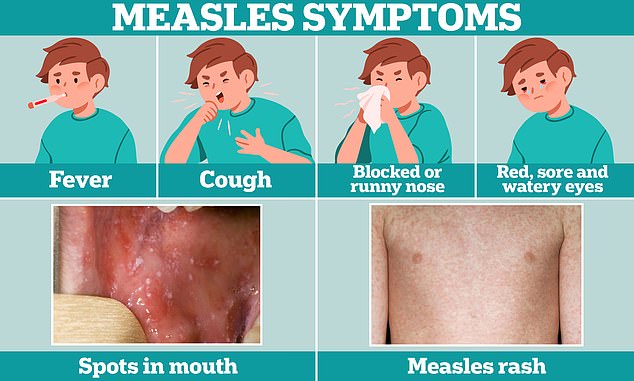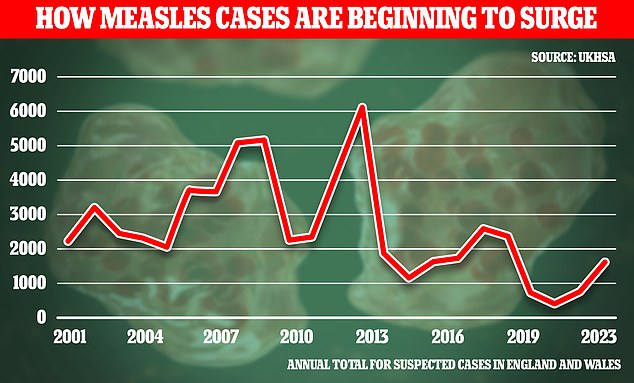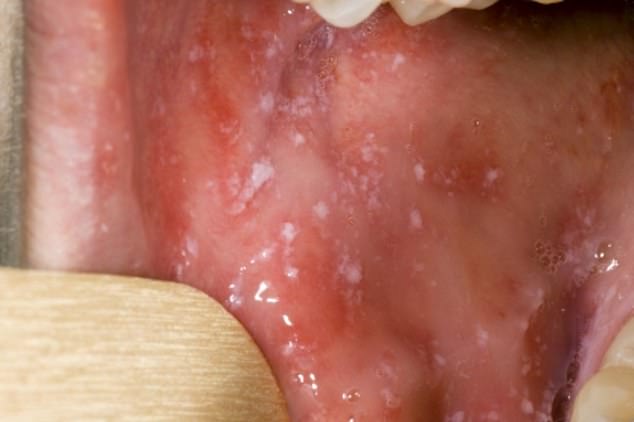Most people recognize a rash as the first sign of measles, but experts say there are many other symptoms that can appear days before.
But some of these symptoms (sneezing, coughing and aches) can easily be mistaken for a cold or flu.
Experts say there is one warning sign parents should look out for that is almost always an indication of measles.
The virus causes tiny white spots on the inside of the cheek that look like “grains of sand” but often go unnoticed, said Helen Bedford, professor of child health at Great Ormond Street Child Health Institute.
She told MailOnline they are called Koplik spots, and can appear inside the cheeks and on the back of the lips, and tend to be around 1 to 3mm in diameter.
One of the first warning signs that is often overlooked is small white spots on the inside of the cheek.
Experts are now warning parents about early warning signs to prevent outbreaks of the virus that “spread like wildfire.”
Measles can be fatal, killing about three in every 1,000 children who contract it, studies show.
Complications include blindness, deafness, and inflammation of the brain (encephalitis).
It is one of the most contagious pathogens known to mankind and can spread through the coughs and sneezes of an infected person.
Symptoms include sneezing, coughing, aches and pains, and the measles rash, but the virus can cause serious complications, including pneumonia and meningitis.
Another telltale sign of measles is the rash, which usually starts on the face and behind the ears before spreading to the rest of the body.
The spots that form the rash may become raised and join together to form irregular patches.
But unlike chickenpox, this rash usually doesn’t itch.
On white skin, the rash appears red or brown. However, it can be harder to see on dark and black skin, according to the NHS.

Cold-like symptoms such as fever, cough, and a runny or stuffy nose are often the first sign of measles. A few days later, some people develop small white spots on the inside of their cheeks and the back of their lips. The characteristic measles rash also appears, usually starting on the face and behind the ears before spreading to the rest of the body.

The latest data from the UK Health Security Agency (UKHSA) shows there were 1,603 suspected cases of measles in England and Wales in 2023. The figure is more than double the 735 recorded in 2022 and a nearly five-fold increase compared to the 360 cases reported in 2021.
Earlier this year, the UK Health Security Agency (UKHSA) revealed that measles cases were on the rise.
The UK has suffered its biggest measles outbreak in 10 years, with cases in February rising more than the last major outbreak in 2013.
Analysis shows that if just one child in a classroom becomes infected, they can transmit the virus to nine other unvaccinated children, making it one of the most infectious diseases globally and more infectious than Covid.
“If a child is ill with what is thought to be measles, it is best for parents to call a doctor first rather than rushing the child to the GP, because measles is highly contagious and spreads like wildfire,” Professor Bedford said.
Without treatment, the best strategy is defense, through the highly infectious measles, mumps, and rubella (MMR) vaccine.
Two doses of the MMR vaccine—administered at one year of age, then at three years and four months—offer lifelong protection.
After both doses, 99 percent of people are protected against measles.
In January, the NHS launched a catch-up campaign, with pop-up clinics in schools and letters sent to millions of people, in the hope of increasing vaccine uptake.
Steve Russell, NHS Director of Vaccinations and Screening: ‘People who are unvaccinated can receive catch-up doses at MMR pop-up centres in schools and other convenient locations, while GPs, teachers and community trust leaders are encouraging groups less likely to be vaccinated to come forward.’
But it’s never too late to get vaccinated. People who haven’t been vaccinated can schedule an appointment at any time by contacting their GP.
“The most important thing is to vaccinate children. Some people think their children are past the recommended age for vaccination, but it’s never too late. Children can be vaccinated into adulthood,” Professor Bedford added.


